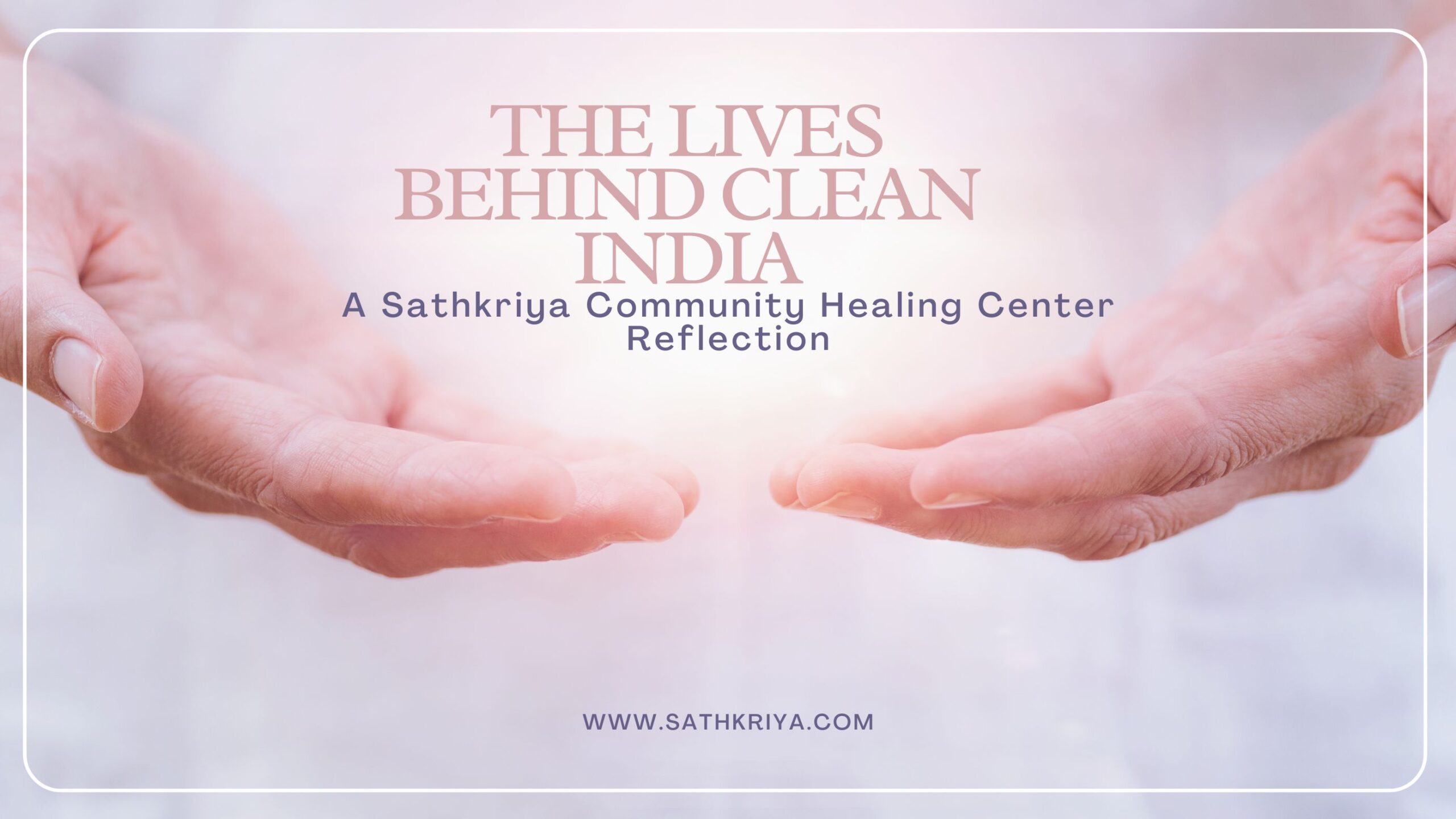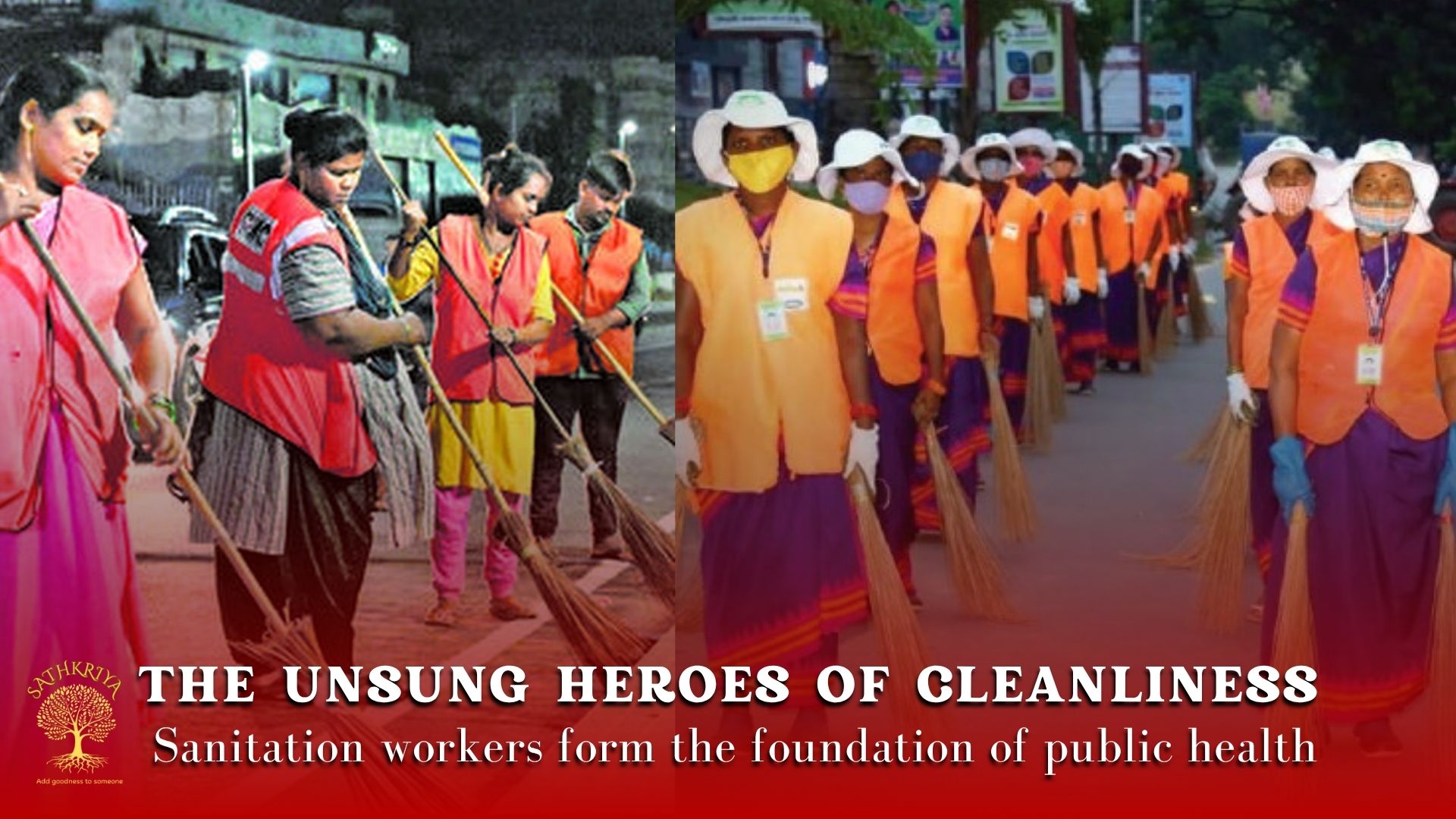When you look at a clean street or see safe water flow, do you picture the people who made it possible? The Lives behind Clean India are not faceless. They are neighbors, children, mothers, elders, and workers who care. Swachh Bharat Mission, started in 2014, asked India to build toilets, manage waste, and keep public spaces healthy. It matters for health, safety, and dignity. At the Sathkriya Community Healing Center, hygiene meets mental well-being, and community action meets quiet healing. Clean places support calm minds, and calm minds keep places clean.
This reflection shares human stories, simple steps, and lessons from daily life, not statistics. It invites you to see cleaners, mothers, children, and elders as co-creators of a healthier India.
What The Lives behind Clean India Look Like at Sathkriya
Morning light touches a courtyard where water drains well, not into puddles. A child fills a reusable bottle, smiles, and hurries to school. Lunch is cooked in a kitchen that smells of soap and spices, not damp cloth and rot. In the back, two bins sit side by side. One is for wet waste, one is for dry. The labels are clear. The floor is dry to prevent slips. A small change, repeated daily.
A mother wipes the sink and checks the toilet seat. She keeps a little brush and a cloth nearby. It takes two minutes. It saves her time later. It saves her daughter from embarrassment at school. It saves her family from stomach aches in the week ahead.
Across the lane, a handwashing station stands near a shared tap. Children count to twenty with a song their teacher taught them. The habit sticks because it is simple, shared, and fun. Hands are clean before snacks, after play, and before homework. Fewer sick days, more energy for games and study.
In the quiet room at Sathkriya, a counselor talks with a young man who left a stressful job. He says the clutter at home made him feel trapped. Together, they plan small cleanups. One shelf at a time. Order in the room, more ease in his breath. Clean spaces and healing work together.
The nearby toilets are lit and well kept. A group of women decided on a cleaning rota. They made rules and stuck to them. Pride replaces worry. Night walks feel safer. Girls attend school during their periods with less stress. Privacy brings voice.
On pickup day, waste is sorted without fuss. Gloves on, masks on, a nod to safety. Recyclables are set aside, wet waste goes to compost. Streets look cared for. People notice. A simple thank you travels far.
Frontline neighbors who sweep, sort, and serve every day
Picture a composite neighbor we can call Anita. She starts before sunrise, ties her hair, and pulls on gloves and a mask. Her cart has tongs, bags, and a bottle of water. She sorts as she walks, dry on one side, wet on the other. She chats with shopkeepers who set out their bins. School kids wave as they pass. They learned to say thank you. Her work is skilled. She knows which items fetch a fair rate and which should go to compost. Pride shows in the way she lines up bags by color. A kind word from the community lifts her day, and it shows in every sweep.

Women and girls gain safety, privacy, and voice
A working toilet at home changes more than a routine. It changes a woman’s sense of safety. Proper lighting and a door that closes well reduce fear. At school, a bin for pads and a clean washing space keep girls present in class. They speak up more in group work. They show up for practice and exams. Privacy builds confidence, and confidence shows in attendance, grades, and daily smiles.
Children learn hygiene habits that protect health
Kids copy what they see. A 20-second handwash becomes a game, with bubbles and counting. Clean water bottles go in school bags each morning. Play areas stay tidy because cleanup is part of play. Teachers note fewer colds. Parents see fewer trips to the clinic. More time for sports and reading. Healthy habits feel normal, not forced.
Waste workers find steady income and respect
When homes sort waste at the source, the day runs safer. Glass goes separate, so no cut hands. Food waste goes to a compost pit, so no smell in the lane. Recyclables get fair rates with local buyers. A thank-you wall in the neighborhood, with names and photos, tells workers they matter. Respect is not a bonus. It is part of the job.
Healing meets hygiene: how a community center powers Clean India
Sathkriya blends health education, counseling, and neighborhood action with the goals of Swachh Bharat Mission, launched in 2014. It keeps things simple and clear. Clean spaces reduce stress. Order gives the mind a rest. When people feel calm, they keep spaces clean. This loop builds strength over time.
The center acts as a hub. It hosts practical sessions, supports families, and links volunteers with local needs. No heavy jargon, just everyday steps. A handwashing station in a busy lane. A two-bin rule for homes. A clean toilet that stays open and lit. Counselors help people deal with shame or fear around sanitation. Volunteers help track progress and celebrate milestones. Trust grows, and the habits stick.
Simple workshops that stick: soap, water, and stories
Workshops show, not just tell. A bucket, a bar of soap, and a 20-second demo. Kids practice the steps and teach them at home. Role-plays help them remind peers with kind words. Posters in local languages make the message easy. Stories travel faster than rules. A grandmother’s tip for saving water. A child’s song for handwashing. These stay in the head and the heart.
Counseling that restores dignity, especially for women
Group circles give women a place to speak about safety, shame, and confidence. One-on-one talks address stress that grows from poor sanitation. When toilets work, anxiety drops. When lighting improves, fear eases. Better sanitation supports mental health. Dignity returns. With dignity, families keep up the routine, even on busy days.
Neighborhood clean-ups and toilet use campaigns
Monthly clean-ups bring people together. Volunteers pick a lane, take before-and-after photos, and share them on the notice board. Door-to-door chats encourage toilet use and explain what to do if a toilet breaks. Teams track open defecation free milestones and help keep them. Progress is visible, and pride is shared.
Sorting waste creates jobs and cleaner streets
The two-bin system, wet and dry, keeps sorting simple. Community compost pits turn peels into soil for plants. Ties with local recyclers turn plastics and paper into income. Safety gear matters. Gloves, masks, and tongs protect hands and lungs. With steady routines, waste workers get steadier pay. Streets stay cleaner, and people breathe easier.
How you can join The Lives behind Clean India today
Change starts at your doorstep. Keep it friendly and low stress. You do not need big budgets. You need a routine that fits your life. Start small, repeat often, and share credit with those who help. Use a short starter list. Keep a simple weekly plan. Offer help to a local group. Every step counts when it becomes a habit.
Make it a team effort at home. Invite kids to draw labels for bins. Ask elders for water-saving tips. Thank the people who collect your waste. Join a cleanup that matches your schedule. If all you do this week is add a handwashing song before meals, you are on your way.
Start at home with three easy habits
- 20-second handwash routine: wet, soap, scrub palms and nails, rinse, dry.
- Two-bin waste rule: wet for food waste, dry for plastic, paper, and metal.
- Keep toilets dry and clean daily: quick wipe, brush, and a splash of cleaner.
- Tip: make a kid-friendly chart on the fridge to track these habits.
Volunteer with a local center or school group
Offer an hour a week. You could be a hygiene coach for kids, a clean-up day organizer, or a poster maker. Respect local schedules. Listen first. Ask what is needed. Your steady presence matters more than a grand plan.
Build a simple clean kit
Pack a small kit at home or in your scooter. Include soap, a reusable water bottle, gloves, masks, tongs, reusable bags, and a small first-aid packet. Reuse what you can. Handle sharp items with care and pass them to trained workers.
Measure and celebrate small wins
Use a weekly checklist. Fewer trash bags? More items recycled? A cleaner sink and toilet? Fewer sick days at home? Mark progress and celebrate with a thank-you note for workers. Share a photo of your clean corner to inspire others.
Conclusion
When people heal, places get cleaner. When places are clean, people heal faster. That is the quiet power of the Sathkriya Community Healing Center and of The Lives behind Clean India. In the next 48 hours, pick one step, like setting up two bins or adding a 20-second handwashing song, and do it with someone you care about. Small actions, repeated, change streets and hearts.
To the workers, families, and children who keep India clean each day, thank you. Your care builds a future that looks bright, smells fresh, and feels safe.



